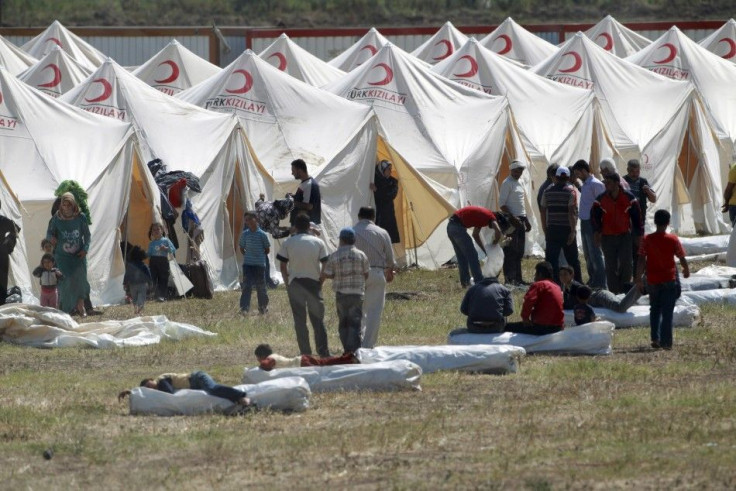Turkey Clamps Down On Border Control, Leaving Syrian Refugees In A Lurch

Turkey is increasing security along its southeastern border while it tries to get a handle on the stream of refugees fleeing Syria's bloody conflict.
This is not a change in policy for Ankara; it is only a stricter adherence to existing rules. A rejection of Syrian refugees without proper paperwork was always the policy -- but what was once only de jure is now increasingly de facto.
For 18 months, a loosely organized force of rebel Syrians has revolted against the regime of President Bashar al-Assad. The bloody battle has cost over 20,000 lives so far, and those who try to escape the brutal warfare will now find it more difficult to make it onto Turkish soil.
Though sympathetic to the rebels' cause, Turkey is feeling increasingly strained by its growing Syrian population. Refugee camps are now reaching full capacity, and new ones cannot be built fast enough. There are reports of tensions between Syrians and Turks, especially in the city of Antakya, where much of the population is Alawite like most of the ruling Syrian regime.
Furthermore, there are fears that the rebel movement in Syria has been infiltrated by extremists and Islamist militants, making illegal border-crossings a serious national security concern for Turkey.
Overall, about 250,000 people have fled from Syria, according to UN estimates. And of all surrounding countries, Turkey shares the largest border with Syria.
Voice of America reports that 80,000 refugees are living in Turkish camps near the Syrian border, and tens of thousands more -- many of whom are undocumented -- have found other lodging within Turkish borders, or else are simply living without a roof over their heads.
To make matters worse, Turkey is only 35 miles away from the major city of Aleppo, which has seen an onslaught of air raids and shelling in recent weeks. That has put an added strain on Turkish refugee camps, prompting tighter controls at a time that couldn't be worse for Syrians.
Syrians who don't go to Turkey have found refuge in other neighboring countries like Jordan and Lebanon.
Iraq, a majority Shia country that has the second-largest share of Syria's borders, is a bit trickier. Baghdad has not called for Assad to step down, and it refused to accept rebel refugees until July. But thousands of Syrian Kurds have crossed over into Iraq's autonomous Kurdistan region.
Meanwhile, countries that support the rebels but are farther off geographically-- particularly those in the Persian Gulf -- are working to provide long-distance aid.
Kuwaiti officials sponsored a meeting of the Gulf Cooperation Council on Wednesday, calling for more international funding for assistance organizations in Syria. And The United Arab Emirates just announced plans to help Jordan open a new refugee camp in the village of Rabah al-Sarhan.
Still, these efforts are not enough to provide for the growing influx of Syrians who are desperately seeking escape. Many of them are piling up at border crossings and makeshift campsites all along the barbed-wire fence that separates Turkey from Syria.
For many of these hopefuls, Turkey's policy change won't dissuade them -- it will only increase the challenge of escape.
According to The Daily Star, a Lebanese newspaper, some Syrians have set up a system to sneak their countrymen through the barbed-wire fence and into safety. Rebel militia commander Abu Mahmud boasted about his talent for subterfuge.
"There are soldiers [along the border] but not many. And there are countless holes in the border fence," he said.
"We make a small diversion by sending one of our men. When he gets himself arrested, entire families manage to get across, further along."
But Turkey is determined to put an end to rackets like these -- at least until it can address the problems caused by the huge refugee influx over the past few months.
"Turkey and other neighboring countries, especially Jordan, are not getting enough international assistance to share the burden of this," said Turkish Foreign Ministry spokesman Selcuk Unal on Thursday, according to Voice of America.
"We are not asking [refugees] to leave the country, but local authorities could of course take some steps from time to time to arrange accommodation of these people in order to let all the provinces in Turkey to have a more equal burden share."
© Copyright IBTimes 2024. All rights reserved.






















